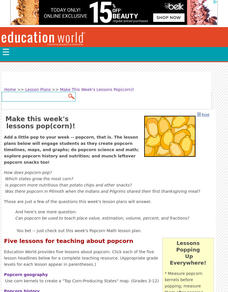Curated OER
Rock, Paper, Scissors - Dominant and Recessive Traits from Parent to Offspring
Fifth graders understand the meaning of dominant and recessive. In this dominant and recessive traits lesson, 5th graders participate in a game and record results on a chart. Students relate experiment to genes. Students describe plants...
Curated OER
Popcorn Action
Students divide one side of paper into three columns: 1) What I see 2) What I smell 3) What I hear. On the other side, have them write two columns: 4) What I feel 5) What I taste. They fill in #1, 2,3 as the teacher pops popcorn.
Curated OER
Make This Week's Lessons Pop(corn)!
Students create popcorn timelines, maps, and graphs; do popcorn science and math; explore popcorn history and nutrition; and munch leftover popcorn snacks too!,
Curated OER
Solids, Liquids and Gases
Students are introduced to the various states of matter. After watching a video, they discover how to compare the three states using its shape and volume. In groups, they participate in an experiment with solids, liquids and gases and...
Curated OER
Sewer Lice
Students observe demonstrations that show adhesion, cohesion, equilibrium density, pressure of gases and solubility. In this gases lesson plan, students observe a demonstration of raisins, spaghetti, and popcorn moving up and down in...
Curated OER
The Amazing Tomato
Students gain an understanding of where our food comes from. In this plant life lesson, students review what plants need for growth and how long it takes them to grow. Students research which plants it takes to make salsa. Students then...
Curated OER
"In/Out Tables of Potential Crop Loss from Defoliation
In this economics worksheet, 4th graders use the data to determine the effects of crop loss due to defoliation from the effects of hail at different stages of growth.
Curated OER
Honey Bunches of Oats
Students explore a variety of crops that are used in our food products utalizing a box of the cereal, Honey "Bunches of Oates." Percentages of each of the three different kinds of flakes present are calculated.
Curated OER
Botany: What are the types of rice?
Learners explore the different types of rice. In this botany lesson, students match characteristics of rice with its variety.
Curated OER
Economics: Products of South Louisiana
Students explore the economy of Louisiana. In this economics lesson, students examine the roles of farmers, processors, and distributors in food production and consumption. Students use flip cameras to record how selected products are made.
Curated OER
Basic Nutrition (Nutri/Food)
Students analyze the nutrition found in a food and compare it to the nutrition found in similar food. They compare the nutrition of different products and complete the student worksheet Pyramid Pizzazz. This can be done at the beginning...
Curated OER
My Five Senses
Students explore their 5 senses. In this 5 senses instructional activity, students participate in activities that require them to use the senses of smell, touch, hearing, taste, and sight.
Curated OER
Commonly Confused Words
In this ESL worksheet, students focus on commonly confused words in the English language. Students complete 20 fill in the blank sentences using the drop down menu to self check each question.
Curated OER
Popcorn!
Second graders pop popcorn as a way to experience the scientific process. They form a hypothesis, carry out an experiment and explain their findings.
Curated OER
Diversity And Adaptations Of Organisms
Seventh graders investigate how organisms respond to environmental stimuli through their behavior. They observe how plants and animals respond to varying amounts of light, water and gravity.
Curated OER
Homonyms - Quiz 16
In this interactive homonyms quiz activity, learners use the drop down menu in each of 20 examples. They choose the homophone that fits each sentence and check with the answer in the drop down menu.
Curated OER
Reaction Rates and Catalysis in Ethanol Production
Students investigate alternative catalysts for the degradation of hydrogen peroxide. In this fermentation lesson students complete an activity that breaks down cellulose into sugar.
Curated OER
ESTIMATION
Pupils practice estimating and counting and using a ruler to measure distance.
Curated OER
Kansas vs the U.S.
Learners demonstrate an understanding of the physical and political geography of Kansas. They view maps and films to gain knowledge of Kansas. They calculate the percentage Kansas harvests for each crop out of the national total.
Curated OER
BUS: From Farm to Table (Ag)
Students study about how the world's most important grains and how they are used. They design an ingredient list for the cereal box to be designed in the Marketing Lesson Option #1.
Curated OER
Breads Around the World
Pupils read about bread. In this lesson plan studying bread, students read about the history of bread and it's significance around the world. Pupils identify the three main crops used to make bread and ten common types of bread from...
Curated OER
Grinding Stones # 2
Second graders discuss and explore the Navajo tradition of grinding with stones. They observe how the grinding stone is used and then they practice using the grinding stones themselves.
Curated OER
Evolution: Adaptation
Tenth graders practice new skills and apply them. The skills of research should motivate them to want more knowledge. The concept of adaptation is used as a context for the lesson of practicing research skills.
























